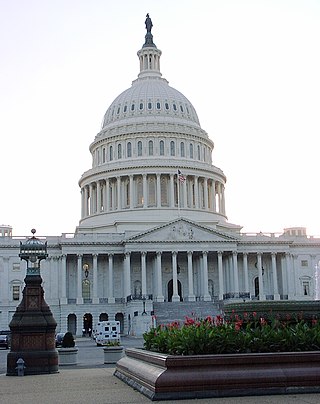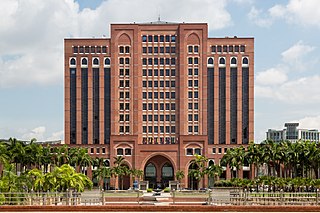| Act of Parliament | |
 | |
| Citation | 7 Geo. 4. c. 54 |
|---|---|
The Aliens Act 1826 was an Act of Parliament that required immigrants to inform the Secretary of State or the Chief Secretary of Ireland of their place of residence twice a year.
| Act of Parliament | |
 | |
| Citation | 7 Geo. 4. c. 54 |
|---|---|
The Aliens Act 1826 was an Act of Parliament that required immigrants to inform the Secretary of State or the Chief Secretary of Ireland of their place of residence twice a year.
The text is available for consultation at The National Archives:

The governor of Victoria is the representative of the monarch, currently King Charles III, in the Australian state of Victoria. The governor is one of seven viceregal representatives in the country, analogous to the governors of the other states and the governor-general federally.

The United States Department of Labor (DOL) is one of the executive departments of the U.S. federal government. It is responsible for the administration of federal laws governing occupational safety and health, wage and hour standards, unemployment benefits, reemployment services, and occasionally, economic statistics. It is headed by the Secretary of Labor, who reports directly to the President of the United States and is a member of the president's Cabinet.

The National Security Act of 1947 was a law enacting major restructuring of the United States government's military and intelligence agencies following World War II. The majority of the provisions of the act took effect on September 18, 1947, the day after the Senate confirmed James Forrestal as the first secretary of defense.

The United States presidential line of succession is the order in which the vice president of the United States and other officers of the United States federal government assume the powers and duties of the U.S. presidency upon an elected president's death, resignation, removal from office, or incapacity.

The United States Department of War, also called the War Department, was the United States Cabinet department originally responsible for the operation and maintenance of the United States Army, also bearing responsibility for naval affairs until the establishment of the Navy Department in 1798, and for most land-based air forces until the creation of the Department of the Air Force on September 18, 1947.

The 107th United States Congress was a meeting of the legislative branch of the United States federal government, composed of the United States Senate and the United States House of Representatives. It met in Washington, D.C. from January 3, 2001 to January 3, 2003, during the final weeks of the Clinton presidency and the first two years of the George W. Bush presidency. The apportionment of seats in this House of Representatives was based on the 1990 United States census.

The 106th United States Congress was a meeting of the legislative branch of the United States federal government, composed of the United States Senate and the United States House of Representatives. It met in Washington, D.C., from January 3, 1999, to January 3, 2001, during the last two years of Bill Clinton's presidency. The apportionment of seats in the House of Representatives was based on the 1990 United States census. Both chambers maintained a Republican majority.

The chief of staff of the Army (CSA) is a statutory position in the United States Army held by a general officer. As the highest-ranking officer assigned to serve in the Department of the Army, the chief is the principal military advisor and a deputy to the secretary of the Army. In a separate capacity, the CSA is a member of the Joint Chiefs of Staff and, thereby, a military advisor to the National Security Council, the secretary of defense, and the president of the United States. The CSA is typically the highest-ranking officer on active duty in the U.S. Army unless the chairman or the vice chairman of the Joint Chiefs of Staff are Army officers.

The Ancient Monuments and Archaeological Areas Act 1979 or AMAAA was a law passed by the UK government, the latest in a series of Ancient Monument Acts legislating to protect the archaeological heritage of England and Wales, and Scotland. Northern Ireland has its own legislation.

The United States Statutes at Large, commonly referred to as the Statutes at Large and abbreviated Stat., are an official record of Acts of Congress and concurrent resolutions passed by the United States Congress. Each act and resolution of Congress is originally published as a slip law, which is classified as either public law or private law (Pvt.L.), and designated and numbered accordingly. At the end of a congressional session, the statutes enacted during that session are compiled into bound books, known as "session law" publications. The session law publication for U.S. Federal statutes is called the United States Statutes at Large. In that publication, the public laws and private laws are numbered and organized in chronological order. U.S. Federal statutes are published in a three-part process, consisting of slip laws, session laws, and codification.

The 112th United States Congress was a meeting of the legislative branch of the United States federal government, from January 3, 2011, until January 3, 2013. It convened in Washington, D.C., on January 3, 2011, and ended on January 3, 2013, 17 days before the end of the presidential term to which Barack Obama was elected in 2008. Senators elected to regular terms in 2006 completed those terms in this Congress. This Congress included the last House of Representatives elected from congressional districts that were apportioned based on the 2000 census.

The Constitution of the State of Washington is the document that describes the structure and function of the government of the U.S. State of Washington. The constitution was adopted as part of Washington Territory's path to statehood in 1889. An earlier constitution was drafted and ratified in 1878, but it was never officially adopted.

The Northern Ireland Constitution Act 1973 is an Act of the Parliament of the United Kingdom which received the royal assent on 18 July 1973. The Act abolished the suspended Parliament of Northern Ireland and the post of Governor and made provision for a devolved administration consisting of an Executive chosen by the new Northern Ireland Assembly devised under the Sunningdale Agreement; the Assembly had already been created by the Northern Ireland Assembly Act 1973, passed two months earlier.

The Judge Advocate General of the Navy (JAG) is the highest-ranking uniformed lawyer in the United States Department of the Navy. The Judge Advocate General is the principal advisor to the Secretary of the Navy and the Chief of Naval Operations on legal matters pertaining to the Navy. The Judge Advocate General also performs other duties prescribed to them under 10 U.S.C. § 5148 and those prescribed under the Uniform Code of Military Justice.

The Ministry of Home Affairs, abbreviated KDN, MOHA, is a ministry of the Government of Malaysia that is responsible for home affairs: law enforcement, public security, public order, population registry, immigration, foreign workers, management of societies, anti-drug, publication / printing / distribution of printed materials, film control, management of volunteer, rehabilitation and implementation of punishment.

Proposition 1D was a defeated California ballot proposition that appeared on the May 19, 2009 special election ballot. The measure was legislatively referred by the State Legislature. If approved, the proposition would have authorized a one-time reallocation of tobacco tax revenue to help balance the state budget.

Proposition 1E was a defeated California ballot proposition that appeared on the May 19, 2009 special election ballot. The measure was legislatively referred by the State Legislature. If passed Proposition 1E would have authorized a one-time reallocation of income tax revenue to help balance the state budget.

The National Security Council is the principal forum of the president of the Philippines considering national security and foreign policy matters with his senior national security advisors and cabinet officials.

The Constitutional Reform and Governance Act 2010, or CRAG Act, is an Act of the Parliament of the United Kingdom on UK constitutional law which affected the civil service and the ratification of treaties, and made other significant changes. It extends to all parts of the United Kingdom.